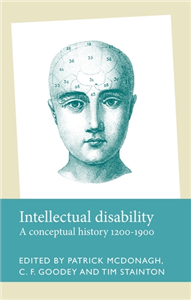Intellectual disability
A conceptual history, 1200–1900
by Patrick McDonagh, C. F. Goodey, Timothy Stainton
Description
More Information
Rights Information
Albania, Algeria, Angola, Argentina, Armenia, Australia, Austria, Bahrain, Belgium, Belize, Benin, Bolivia, Bosnia and Herzegovina, Botswana, Brazil, Bulgaria, Burkina Faso, Burundi, Cameroon, Canada, Cape Verde, Central African Republic, Chad, Chile, China, Colombia, Comoros, Congo [DRC], Congo, Republic of the, Costa Rica, Ivory Coast, Croatia, Czech Republic, Denmark, Djibouti, Ecuador, Egypt, El Salvador, Equatorial Guinea, Eritrea, Estonia, Ethiopia, Faroe Islands, Finland, France, French Guiana, Gabon, Gambia, Georgia, Germany, Ghana, Greece, Guatemala, Guinea, Guinea-Bissau, Guyana, Honduras, Hongkong, Hungary, Iceland, India, Indonesia, Iran, Iraq, Ireland, Israel, Italy, Japan, Jordan, Kazakhstan, Kenya, Kuwait, Latvia, Lebanon, Lesotho, Liberia, Libya, Lithuania, Luxembourg, Macau, China, Macedonia [FYROM], Madagascar, Malawi, Malaysia, Mali, Malta, Mauritania, Mauritius, Mayotte, Mexico, Mongolia, Montenegro, Morocco, Mozambique, Namibia, Netherlands, New Zealand, Nicaragua, Niger, Nigeria, Norway, Oman, Pakistan, Panama, Paraguay, Peru, Philippines, Poland, Portugal, Puerto Rico, Qatar, Reunion, Romania, Russia, Rwanda, Saint Helena, Sao Tome and Principe, Saudi Arabia, Senegal, Serbia, Seychelles, Sierra Leone, Singapore, Slovakia, Slovenia, Somalia, South Africa, South Korea, Spain, Sri Lanka, Sudan, Suriname, Swaziland, Sweden, Switzerland, Syria, Taiwan, Tanzania, Thailand, Timor-Leste, Togo, Tokelau, Tunisia, Turkey, Uganda, Ukraine, United Arab Emirates, United Kingdom, United States, Uruguay, Venezuela, Vietnam, Western Sahara, Yemen, Zambia, Zimbabwe, South Sudan, Cyprus, Palestine, Bangladesh, Cambodia, Liechtenstein, Azerbaijan
Endorsements
This collection explores how concepts of intellectual disability evolved from a range of influences, eventually converging with earlier and decidedly distinct ideas, including 'idiocy' and 'folly', which were themselves generated by very specific social and intellectual environments. The book brings together essays from some of the leading historians of ideas of intellectual disability, and extends across legal, educational, literary, religious, philosophical, and psychiatric histories. Maintaining a rigorous distinction between historical and contemporary concepts, it demonstrates how intellectual disability and related notions were products of the prevailing social, cultural and intellectual environments in which they took form, and also shows how they performed important functions within these environments. Focusing on British and European material from the Middle Ages to the late-nineteenth century, the collection asks 'how and why did these concepts form?' 'how did they connect with one another?' and 'what historical circumstances contributed to building these connections?' But, while the essays focus on the forces shaping ideas of intelligence and disability, they also address the consequences of these defining forces for the people who found themselves enclosed by the shifting definitional field. Intellectual disability is essential reading for scholars interested in the history of intelligence, intellectual disability and related concepts, as well as in disability and social history generally.
Reviews
This collection explores how concepts of intellectual disability evolved from a range of influences, eventually converging with earlier and decidedly distinct ideas, including 'idiocy' and 'folly', which were themselves generated by very specific social and intellectual environments. The book brings together essays from some of the leading historians of ideas of intellectual disability, and extends across legal, educational, literary, religious, philosophical, and psychiatric histories. Maintaining a rigorous distinction between historical and contemporary concepts, it demonstrates how intellectual disability and related notions were products of the prevailing social, cultural and intellectual environments in which they took form, and also shows how they performed important functions within these environments. Focusing on British and European material from the Middle Ages to the late-nineteenth century, the collection asks 'how and why did these concepts form?' 'how did they connect with one another?' and 'what historical circumstances contributed to building these connections?' But, while the essays focus on the forces shaping ideas of intelligence and disability, they also address the consequences of these defining forces for the people who found themselves enclosed by the shifting definitional field. Intellectual disability is essential reading for scholars interested in the history of intelligence, intellectual disability and related concepts, as well as in disability and social history generally.
Author Biography
Patrick McDonagh is a faculty member in the Department of English at Concordia University, Montreal and co-founder of the Spectrum Society for Community Living in Vancouver C. F. Goodey is Honorary Fellow in the Centre for Medical Humanities at the University of Leicester Tim Stainton is Professor in the School of Social Work and Director of the Centre for Inclusion and Citizenship at the University of British Columbia, Vancouver
Manchester University Press
Manchester University Press is a leading UK publisher known for excellent research in the humanities and social sciences.
View all titlesBibliographic Information
- Publisher Manchester University Press
- Publication Date March 2021
- Orginal LanguageEnglish
- ISBN/Identifier 9781526151643 / 1526151642
- Publication Country or regionUnited Kingdom
- FormatPrint PDF
- Pages272
- ReadershipGeneral/trade; College/higher education; Professional and scholarly
- Publish StatusPublished
- Dimensions216 X 138 mm
- Biblio NotesDerived from Proprietary 4597
- SeriesDisability History
- Reference Code13417
Manchester University Press has chosen to review this offer before it proceeds.
You will receive an email update that will bring you back to complete the process.
You can also check the status in the My Offers area

Please wait while the payment is being prepared.
Do not close this window.



